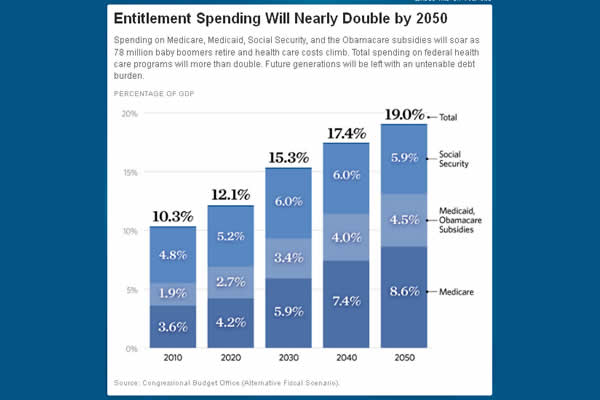The Obama Administration is piggybacking on claims made by MarketWatch’s Rex Nutting that Obama has not gone on the spending spree everyone thinks he has since taking office. As White House press secretary Jay Carney puts it, President Obama has exercised “significant fiscal restraint” and “acted with great fiscal responsibility.”
Nutting writes: “Although there was a big stimulus bill under Obama, federal spending is rising at the slowest pace since Dwight Eisenhower brought the Korean War to an end in the 1950s.” So Nutting gives Obama a free pass for his gargantuan stimulus spending package and then marvels at Obama’s restraint in the following years as if it somehow excuses the excesses and utter failure of the stimulus.
Let’s remember that the stimulus drove spending to a record 25.2 percent of the economy in 2009 and deficits topped $1 trillion for the first time in the nation’s history. This is “great fiscal responsibility”?
Nutting continues, saying spending during Obama’s four budget years has grown at an annualized rate of only 0.4 percent. Yet this statement does not exactly scrub the President’s spending record of its many blemishes.
Nutting, and the Administration, simply ignore the fact that spending reached these record heights following the 2009 stimulus bill. Obama has not rectified this gross overspending habit in the slightest. Remember, the stimulus spending was temporary, yet under Nutting’s own analysis, spending has grown.
Take Obama’s proposed fiscal year (FY) 2013 budget. Mirroring his past budgets, this one would not bring spending below 22 percent of GDP, 10 percent above the post–World War II average of 20.2 percent of GDP. Obama instead proposes to spend even more, especially on transportation, infrastructure, education, and research. These initiatives are sold to taxpayers as “investments,” which everyone knows is just a fancy word for “spending” in Washington. There is one area that Obama singles out the budgetary cutting floor: cuts to defense, which would gut our military readiness.
Nutting’s own take on the situation matches this fact:
By no means did Obama try to reverse that spending. Indeed, his budget proposals called for even more spending in subsequent years. But the Congress…stopped him. If Obama had been a king who could impose his will, perhaps what the Republicans are saying about an Obama spending binge would be accurate.
This is exactly the point. Obama, you will recall, wanted a free pass on last summer’s debt ceiling increase so he could keep spending. Republicans insisted there be spending cuts to accompany any hike in the debt ceiling. But Republicans’ requiring the first of many steps necessary to fix the dismal state of the nation’s budget does not make Obama the fiscal savior.
What Obama has ignored is the fact that spending on entitlement programs has steadily grown under his presidency. He has repeatedly failed to tackle the entitlement spending tsunami that will swamp the budget as their costs continue to increase at an alarming rate, doubling as a share of the economy within the next few decades.
The major entitlement programs—Medicare, Medicaid, and Social Security—are the main drivers of future deficits, yet the President has failed to offer any solutions to reform them. He promptly ignored his own deficit commission’s proposals to address the spending and debt crises but proposed none of his own. In fact, Obamacare added a costly new entitlement that will only add to the long-term spending crisis. He pays lip service to the need for strengthening and preserving these programs, and then in the next breath turns to the topic of how earnestly the economy needs government “investments” elsewhere.
This Administration has no solutions that actually tackle the problems of rising spending and debt. Nor do they seem to like any solutions, such as those contained in the House-passed budget proposed by House Budget Committee chairman Paul Ryan (R–WI). Treasury Secretary Timothy Geithner’s commented to the committee, “You are right to say we are not coming before you to say we have a definitive solution. What we do know is we don’t like yours.”
With those words, he encapsulated both the sentiment and the clear failure of the Administration to solve these problems. The only fiscal restraint the Administration seems to have is restraint to act with “great fiscal responsibility.”
